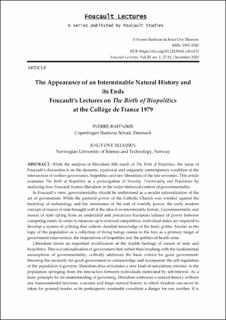| dc.description.abstract | While the analysis of liberalism fills much of The Birth of Biopolitics, the focus of Foucault’s discussion is on the dynamic, equivocal and enigmatic contemporary condition at the intersection of welfare governance, biopolitics and neo-liberalism of the late seventies. This article examines The Birth of Biopolitics as a prolongation of Security, Territoriality and Population by analyzing how Foucault frames liberalism in the wider historical context of governmentality.
In Foucault’s view, governmentality should be understood as a secular rationalization of the art of government. While the pastoral power of the Catholic Church was wielded against the backdrop of eschatology and the imminence of the end of worldly power, the early modern concept of reason of state brought with it the idea of an interminable history. Governmentality and reason of state spring from an undecided and precarious European balance of power between competing states. In order to measure up to external competition, individual states are required to develop a system of policing that collects detailed knowledge of the body politic. Insofar as the logic of the population as a collection of living beings comes to the fore as a primary target of government intervention, the imperatives of biopolitics and the politics of health arise.
Liberalism forms an important modification of the double heritage of reason of state and biopolitics. This is a rationalization of government that, rather than breaking with the fundamental assumptions of governmentality, critically addresses the basic criteria for good government. Stressing the necessity for good government to acknowledge and incorporate the self-regulation of the population it governs, liberalism thus articulates a new kind of naturalness intrinsic to the population springing from the interaction between individuals motivated by self-interest. As a basic principle for its understanding of governing, liberalism embraces a natural history without any transcendental horizons, a secular and tragic natural history in which freedom can never be taken for granted insofar as its participants constantly constitute a danger for one another. It is also a mode of history in which the art of government is constantly called upon and forced to organize and secure the conditions for the exercise and development of freedom. For Foucault, thus, the liberal art of government is not a position to be affirmed or denied. Rather, the liberal art of government draws the outline of an experience of historicity that is an experience of an ongoing and unsettling, but also unending, crisis. | en_US |

